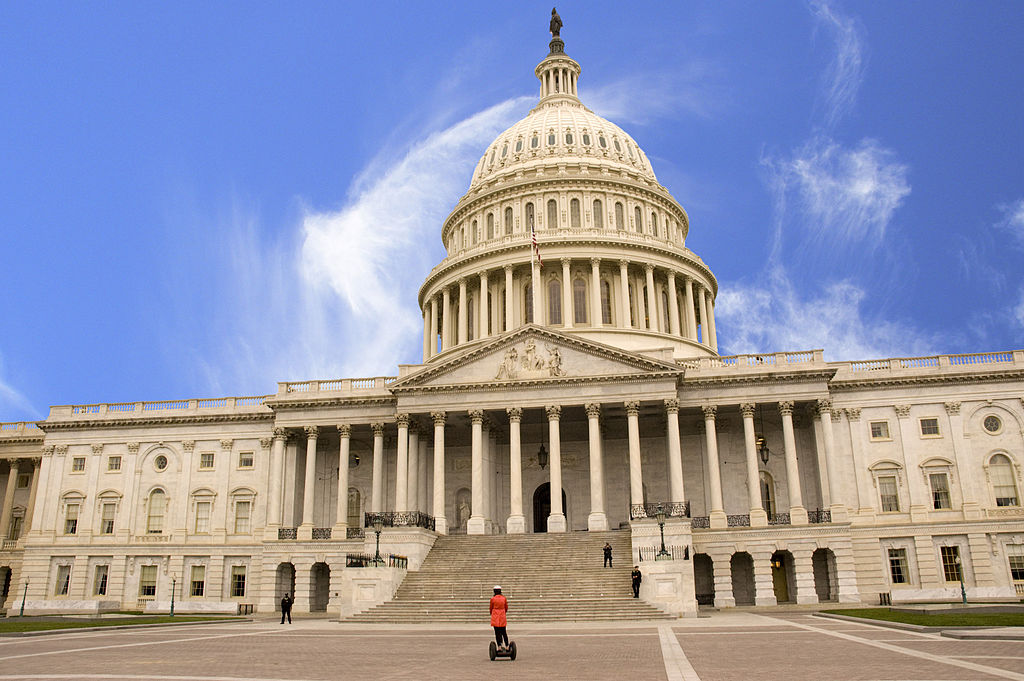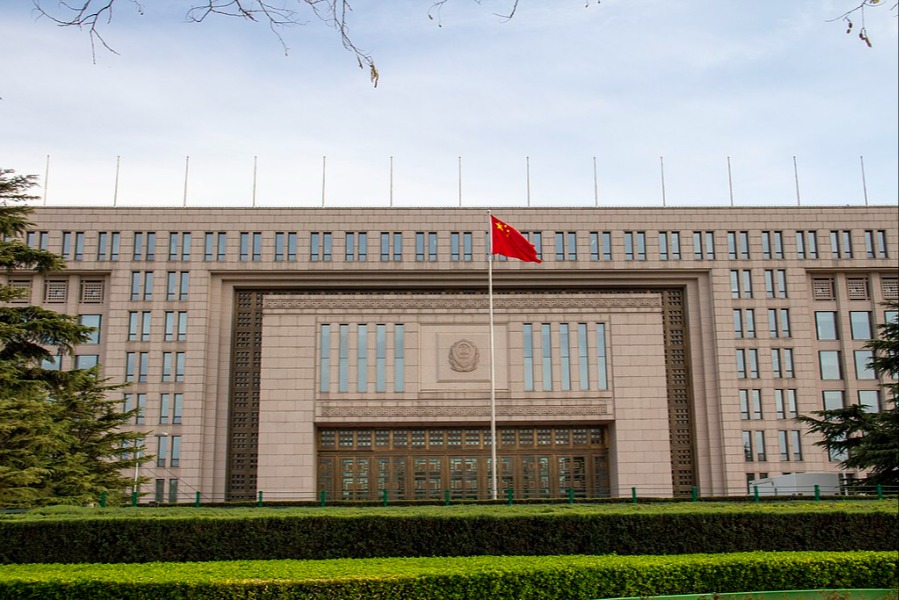Sanctions Are Congress’s Path Back to Foreign Policy Relevance
On March 15, the Treasury Department issued its first sanctions under a sweeping law signed by President Trump last August. The department both reiterated previous U.S. sanctions against two Russian intelligence agencies and targeted a number of Russian cyber officials.

Published by The Lawfare Institute
in Cooperation With

On March 15, the Treasury Department issued its first sanctions under a sweeping law signed by President Trump last August. The department both reiterated previous U.S. sanctions against two Russian intelligence agencies and targeted a number of Russian cyber officials. Additionally, pursuant to Executive Order 13694, the administration designated the sixteen Russian malfeasants indicted last month by Special Counsel Robert Mueller for interfering in the 2016 election.
This month’s sanctions ended months of suspense over the Trump administration’s approach to the Countering America’s Adversaries Through Sanctions Act. The law, passed by veto-proof majorities in both houses of Congress, both required new sanctions against Russia for its malicious cyber activities and placed unprecedented restrictions on the president’s discretion to implement and lift those sanctions.
The president had made no secret of his distaste for the law, calling it “significantly flawed” and promising that he could “make far better deals with foreign countries than Congress.” Then, for several months, the White House blew past deadlines to implement the sanctions, claiming they were not needed because the very existence of the law on the books was deterring Russian interference.
Trump’s decision to finally implement the sanctions seemed like a return to normalcy—a delayed acknowledgement by the president of his constitutional responsibility to enforce statutes duly enacted by Congress. But the extent to which Congress forced Trump’s hand in imposing even these modest sanctions is actually quite unusual. It is rare for Congress to compel the president to implement a foreign policy program with which he fundamentally disagrees, much less one that bolsters the legitimacy of a federal investigation into his campaign.
This episode sheds light on an important fact: Sanctions are a foreign policy tool uniquely entrusted to Congress by the Constitution, which provides that Congress shall “regulate commerce with foreign nations.” Unlike the other major levers of U.S. foreign policy—diplomacy and military force, over which the Constitution divides control between Congress and the executive—the president has no inherent power to impose sanctions or to refuse to implement congressionally mandated sanctions. As sanctions continue to grow in importance, becoming the default U.S. policy response to a range of international crises, Congress will enjoy newfound potential to shape U.S. foreign policy in ways that have eluded it for decades.
When Congress passes laws that contravene the executive branch’s foreign policy priorities, the president often seeks a constitutional escape hatch. Presidents’ lawyers regularly urge them to disregard statutes that the executive understands to infringe on its inherent military and diplomatic powers.
Every administration does this. President George H.W. Bush declined to follow a statute that would have capped the number of U.S. military personnel deployed in Europe. President Bill Clinton’s Justice Department advised the president to disregard a statute that would limit his ability to place U.S. forces under United Nations command. In 2002, when Congress passed a law effectively requiring the State Department to recognize Israeli sovereignty over Jerusalem, President George W. Bush refused to implement it, arguing that the law would “interfere with the President's constitutional authority to … speak for the Nation in international affairs and determine the terms on which recognition is given to foreign states.” President Barack Obama ignored a law that tried to stop U.S. diplomats from attending U.N. meetings chaired by state sponsors of terrorism.
Of course, not every refusal to follow a law passed by Congress is unconstitutional. The Supreme Court has acknowledged, most recently in Zivotofsky v. Kerry, that a president should prevail over the contrary will of Congress if the executive’s constitutional powers are “both exclusive and conclusive on the issue.” As commander in chief and America’s top diplomat, the president enjoys certain constitutional powers that cannot be defeated by Congress. For example, Congress cannot directly compel the president to negotiate a treaty, recognize a foreign nation, or send military forces into battle.
But sanctions are different. From a policy perspective, presidents might reasonably see sanctions as an alternative to diplomacy and military force—as just another tool at their disposal. The constitution begs to differ. Whereas the Constitution divides responsibility for war and diplomacy between the two branches, it vests Congress with the exclusive authority to regulate foreign commerce.
Congress has always had this constitutional power, and the president has always been without it. In practice, however, Congress has tended to recognize the benefits of giving the president leeway to impose sanctions in response to foreign threats. As a result, throughout U.S. history, Congress has broadly delegated to the president control over America’s tools of economic coercion. Laws like the World War I-era Trading With the Enemy Act and the International Emergency Economic Powers Act of 1977 handed the president practically unlimited discretion to impose sanctions for national security purposes, in wartime and peacetime alike.
But any power that Congress may give, it may also take away. And in recent years—skeptical first of the Obama administration’s approach to Iran and then of the Trump administration’s approach to Russia—Congress has begun taking back the reins of sanctions policy. It has done so by mandating that specific sanctions be imposed and by limiting the executive branch’s ability to lift existing sanctions.
In 2011, for example, unsatisfied with the Obama administration’s pressure campaign against Iran, Congress sought to restrict Iranian oil exports through sanctions on foreign banks that processed oil transactions with the Central Bank of Iran. Administration officials publicly lobbied against the proposal, worried that it would disrupt their diplomatic efforts and cause a spike in oil prices that could benefit Iran. Congress persisted, Obama relented, and the sanctions were codified in Section 1245 of the 2012 National Defense Authorization Act. These sanctions—which could be waived for any jurisdiction that significantly reduced its purchases of Iranian oil—helped cut Iran’s exports in half between 2012 and 2015 and are as responsible as anything else for bringing Iran to the negotiating table.
What all this means is that there is now a major lever of U.S. power—economic coercion—that is far less subject to presidential control than the traditional foreign policy tools of diplomacy or military force. At the same time, the United States is increasingly relying on economic coercion to advance its interests. In the last decade, successive presidents have turned to sanctions to achieve some of their most important goals, including constraining Iran’s nuclear program, punishing Russia’s annexation of Crimea and preventing the financing of terrorist organizations.
Sanctions, then, offer Congress a path back to foreign policy relevance after years of abdicating responsibility to the executive. Members of Congress seem to understand this. Sen. Bob Corker, the chairman of the Foreign Relations Committee, applauded the Senate’s passage of the 2017 sanctions legislation by noting, “For decades, Congress has slowly and irresponsibly ceded its authorities to the executive branch, particularly as it relates to foreign policy. Today marks a significant shift of power back to the American people’s representatives.”
The rise of sanctions as a foreign policy tool uniquely suited to congressional control has its benefits. A Congress that is trigger-happy when it comes to sanctions can enhance the U.S. bargaining position. This was the case in the lead-up to the Iran nuclear deal, when the Obama administration played the good cop to Congress’s bad cop. The Iran deal also showed that Congress can use leverage it gains from its control over sanctions to have a greater say in U.S. international agreements and—to the extent that diplomacy and economic pressure are seen as an alternative to war—debates over the use of military force. At bottom, wielding sanctions gives Congress an opportunity to restore the executive-legislative balance in foreign relations.
But in its zeal to assert control, Congress should avoid two important pitfalls. First, sanctions shouldn’t be used to score cheap political points. The near-unanimous vote tallies in landmark sanctions bills of the last decade reveal the extent to which imposing sanctions is irresistibly good domestic politics. Sanctions are a win-win for members of Congress: They can tell their constituents that they are doing something about a foreign threat and register a disagreement with the president without risking unpopular or ill advised military action. But sanctions are not merely symbolic political acts; they are powerful financial weapons that can upend international politics. Congress should use this tool judiciously.
Second, even when Congress mistrusts the president’s foreign policy priorities, it should not deny the president all flexibility in the enforcement of sanctions. Congress often includes waiver provisions in its mandatory sanctions legislation, allowing the president to lift sanctions when the national interest requires it. Preserving some wiggle room is good policy. When the United States imposes sanctions in order to change an adversary’s behavior, the implicit deal being offered is that the sanctions will be lifted when the behavior changes. But those adversaries will hesitate to change their behavior if they doubt that the sanctions relief will be forthcoming because of U.S. domestic politics. Foreign governments may not trust Congress to act in good faith, or to respond quickly to changes on the ground.
Perhaps this is what Trump had in mind when he boasted that he could “make far better deals” than Congress. But when the president’s proposed deal involves ignoring Russia’s attack on American democracy, Congress ought to be skeptical. The president may have the right to speak for the nation, but thanks to sanctions, Congress will have its say too.





